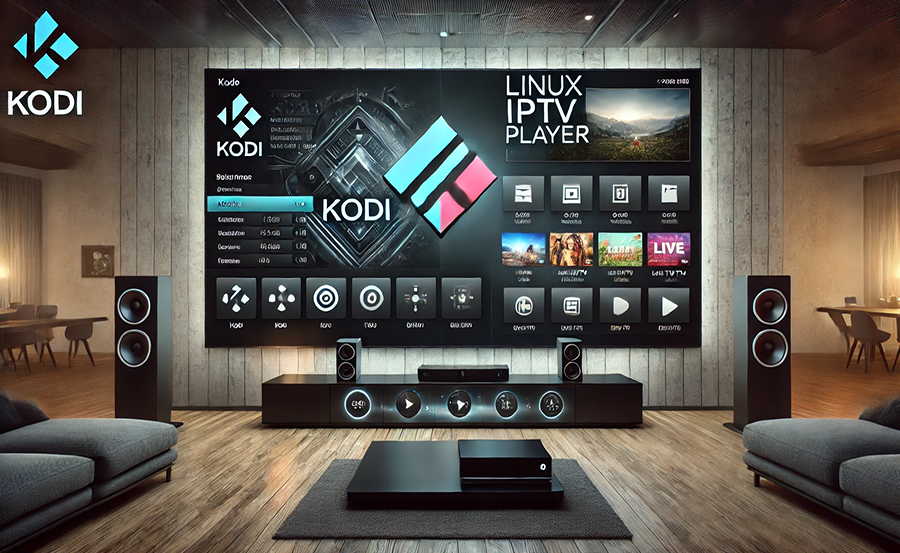In today’s fast-paced world, staying entertained is essential. For Linux enthusiasts, the options can be a bit overwhelming, particularly when deciding on the best IPTV player. Kodi and SMPlayer often come up as two of the leading contenders. But which truly caters to your streaming needs? More importantly, how can you make the most of your experience with a service like Apollo IPTV, hailed as the best IPTV subscription in the world? Let’s navigate this terrain together.
Understanding IPTV and Its Rise on Linux Platforms
Internet Protocol Television (IPTV) has completely transformed how we consume content. Instead of relying on traditional cable or satellite services, IPTV allows for streaming television content via the internet. This shift has been particularly appealing to Linux users who prefer open-source solutions.
Linux offers a robust platform for IPTV due to its flexibility and capabilities. The growth of IPTV on Linux reflects a broader trend: users seeking customizable and efficient ways to stream digital content. Whether it’s the allure of reduced costs or simply the love of open-source software, Linux users are leading the charge.
Pro Tip:
Experience the future of TV with 3 Months Gen IPTV Subscription your gateway to unlimited entertainment.
But why do users gravitate towards platforms like Kodi and SMPlayer? What makes them stand out in the crowded streaming software market? These questions become even more pressing as services like Apollo IPTV emerge, offering unmatched content variety and streaming quality.
Kodi: The Open-Source Giant
What is Kodi?
Kodi is an open-source media player that has been around since 2002, starting life as the Xbox Media Player. Over the years, it has grown into a comprehensive platform that supports a wide range of content formats. Known for its flexibility, Kodi can be tailored to suit various user needs through its robust add-on ecosystem.
The versatility of Kodi is one of its main attractions. You can stream videos, music, podcasts, and even live television. It’s an all-in-one hub for digital media, making it a favorite for tech-savvy users looking to fully control their media experience.
Strengths of Kodi on Linux
One of the major benefits of using Kodi on Linux is the customization it offers. With a plethora of community-driven add-ons, users can expand Kodi’s capabilities well beyond basic streaming. Whether it’s integrating with other services or enhancing playback, the possibilities are virtually endless.
Another notable aspect of Kodi is its support for a wide array of formats. Unlike many proprietary players, Kodi handles nearly any media format you throw at it, making it ideal for those who have a diverse media library.
Room for Improvement
Despite its strengths, Kodi does have areas that need improvement. Its highly customizable nature can sometimes lead to a steep learning curve for new users who are unfamiliar with configuring add-ons and plugins.
Occasional bugs and the necessity for regular updates can also be a minor inconvenience. However, for many Linux users, these drawbacks are a small price to pay for an otherwise powerful media center solution.
SMPlayer: The Lightweight Contender
Introducing SMPlayer
SMPlayer is another robust choice for Linux users. Unlike Kodi, SMPlayer started as a simple media player but has since expanded its features to include significant IPTV functionality. It prides itself on being lightweight and nimble, with an emphasis on efficiency.
SMPlayer offers an intuitive interface that appeals to users who prefer simplicity over a wider array of options. This makes it a delightful choice for those who want an out-of-the-box experience without delving into the complexities of additional configurations.
Advantages of Using SMPlayer
One of SMPlayer’s greatest strengths is its lightweight nature, meaning it doesn’t hog system resources, making it particularly appealing to users on older hardware. Its straightforward design also means it’s easy to pick up and use, with a focus on providing an efficient streaming experience.
SMPlayer is also known for having excellent support for subtitles and its ability to remember settings, even on a per-file basis. This subtle attention to user habits enriches the viewing experience.
Limitations to Consider
The trade-off for its simplicity is that SMPlayer lacks some of the advanced customization options found in Kodi. Users looking for a complex, highly personalized setup might find SMPlayer somewhat limiting.
Moreover, while it can handle a decent range of media formats, its native support does not extend as far as Kodi’s. This may not be a concern for most, but it’s worth noting if your media collection is particularly diverse.
The Role of Apollo IPTV in Enhancing Your Experience
Why Choose Apollo IPTV?
Apollo IPTV stands out as a premium choice for IPTV services worldwide. With access to thousands of channels globally, including news, sports, movies, and more, it offers something for everyone. Its strength lies in the sheer variety of content and the reliability of its streams, meeting the expectations of even the most demanding viewers.
Choosing Apollo IPTV enhances your media player, unlocking its full potential. Whether you’re using Kodi or SMPlayer, its world-class service is compatible with both, providing seamless integration and superior performance.
Key Features of Apollo IPTV
- Extensive channel lineup, including international and regional options.
- High-definition streaming for most channels.
- User-friendly interface that integrates smoothly with major media players.
- Reliable and consistent stream with minimal buffering.
Seamless Integration and Optimal Performance
Apollo IPTV is designed for optimal integration with both Kodi and SMPlayer. Its compatibility with various media players ensures you’re never forced into using a single application. This flexibility lets users showcase the strengths of their chosen platform, enhancing the viewing experience.
The blend of Apollo IPTV and Linux media players like Kodi and SMPlayer delivers a best-in-class entertainment setup where performance and choice perfectly align.
Your Decision: Kodi, SMPlayer, or Both?
Evaluating Your Needs
Your choice between Kodi and SMPlayer should align with your specific needs and preferences. Consider factors such as your hardware capabilities, desired level of customization, and the types of media you frequently consume. Kodi offers unparalleled versatility, while SMPlayer boasts simplicity and low resource usage.
Remember that integrating Apollo IPTV with either option dramatically expands your media options. Delivering superior service and channels, Apollo IPTV amplifies the strengths of both players.
Exploring a Hybrid Approach
There’s no rule that says you have to stick with just one player. Many users find success in utilizing both Kodi and SMPlayer. This dual approach leverages the strengths of each program, offering flexibility and convenience.
Opting for a mix allows users to switch seamlessly between platforms, accommodating any type of media or streaming situation. Whether it’s a simple local playback or a complex live streaming setup, having both players ready can be a strategic advantage.
Conclusion: Embark on Your Streaming Journey
Choosing between Kodi and SMPlayer ultimately hinges on your personal preferences and needs. Both options bring their unique strengths to the table, especially when paired with an exceptional service like Apollo IPTV. By leveraging the capabilities of your chosen media player along with Apollo IPTV, you’re set to experience the pinnacle of seamless streaming. Embark on your journey today; the world of limitless entertainment awaits.
FAQs about Choosing Linux IPTV Players

1. What makes Apollo IPTV the best IPTV subscription?
With its extensive channel lineup, high-quality streaming, and seamless integration with popular players like Kodi and SMPlayer, Apollo IPTV delivers a superior subscription experience unmatched in the market.
2. Can I use Apollo IPTV with both Kodi and SMPlayer simultaneously?
Yes, Apollo IPTV can be configured for use with both Kodi and SMPlayer, allowing you to take advantage of each player’s unique strengths based on your viewing content and needs.
3. Is Kodi’s customization worth the learning curve?
For many users, the customization options of Kodi are well worth the initial complexity. It allows for a truly unique and personalized media experience, which is valuable if you’re tech-savvy and enjoy tailoring your media environment.
4. Does SMPlayer support a wide range of media formats?
While SMPlayer supports a good number of standard formats, it might not cover as many as Kodi. However, it does efficiently handle the most common types of media files needed for everyday use.
5. How can I improve streaming reliability on Linux?
Ensure your internet connection is strong and stable. Optimizing your network settings and using a quality service like Apollo IPTV can significantly enhance your streaming reliability and quality on Linux.
Top EPG Providers You Need to Know


